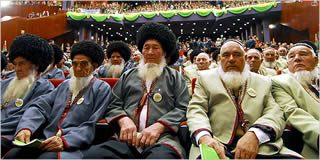



 |
 |
 |
| Thursday November 7, 2024 | University of Exeter > EXTS > Research |
|
Central Asian and Black Sea StudiesAt Exeter the study of the wider Turkic world centres on the themes of ancient Black Sea studies and contemporary Central Asian politics. 
The Central Asian region has long been home to peoples who have in the contemporary era been labelled ‘Turkic’. Today these peoples are known as Kazakhs, Kyrgyz, Turkmens, Uzbeks, Karakalpaks and Uighurs. Since the dissolution of the Soviet Union and declarations of national independence the first four of these now lend their names to independent sovereign states, whilst the Karakalpaks remain represented in an autonomous region of Uzbekistan and the Uighurs are subordinated to Han colonization in Western China. 
However, minorities of all these Turkic peoples and other lesser known groups are found in states across the region. In this environment, the government of Turkey has in recent years retreated from its early-1990s promotion of the ‘Turkish model’ and a ‘greater Turkic world’. However, Turkish commercial interests and educational projects remain strong in the region with a number of multi-national companies, investors, universities and institutes. 
John Heathershaw’s work considers the nature of international politics in this post-Soviet context. His study of Central Asian regional organization and nation-building seeks to ground contemporary discourses and practices in both their historical antecedents and the wider context of geopolitics. Exeter has well established interests in these regions both in antiquity and in the present day, as represented by Prof. David Braund (Professor of Ancient Black Sea Studies) and Dr John Heathershaw (Dept of Politics, HuSS). These constitute an important area for the historical and social study of Turkic as well as Turkish culture. |
|
The University of Exeter, The Queen's Drive, Exeter, Devon, UK EX4 4QJ |